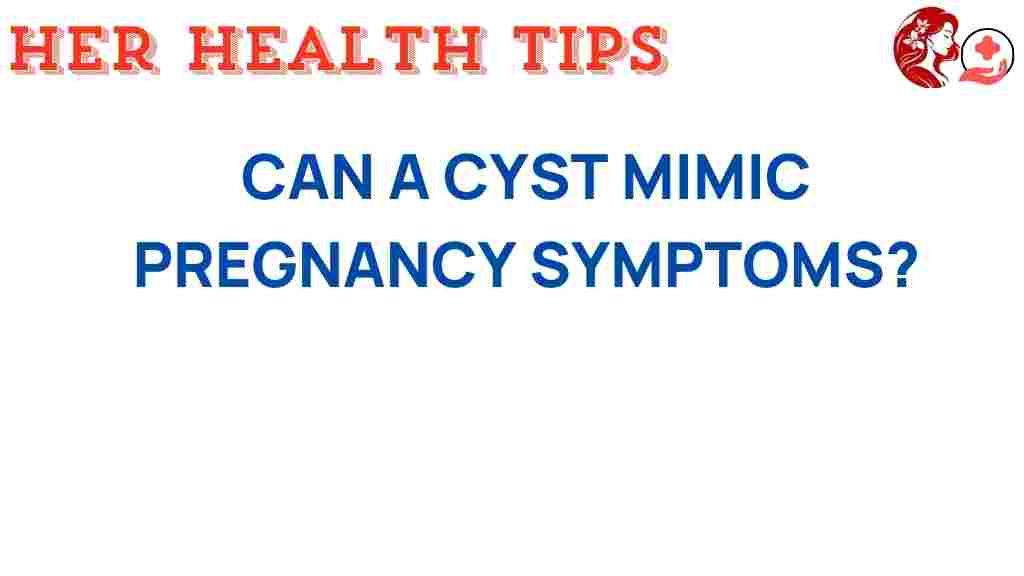Uncovering the Truth: Can a Cyst Mimic Pregnancy Symptoms?
Women often experience a variety of symptoms that can be confusing and concerning, especially when it comes to reproductive health. One common question that arises is whether cyst symptoms can mimic pregnancy signs. Understanding this relationship is crucial for health awareness and proper diagnosis. In this article, we will explore the links between ovarian cysts and pregnancy symptoms, debunk common medical myths, and provide insights into women’s health.
Understanding Ovarian Cysts
Ovarian cysts are fluid-filled sacs that develop on the ovaries. They are quite common and can occur at any age. Most cysts are benign and often go unnoticed. However, some can cause discomfort or mimic other conditions, including pregnancy.
Common types of ovarian cysts include:
- Functional cysts: These occur during the menstrual cycle and include follicular and corpus luteum cysts.
- Dermoid cysts: These can contain various types of tissue, such as hair and skin.
- Cystadenomas: These develop from ovarian tissue and can become quite large.
How Cyst Symptoms Overlap with Pregnancy Signs
Many women may not realize that the symptoms of ovarian cysts can overlap with those of early pregnancy. This is particularly true for functional cysts, which can cause hormonal fluctuations. Here are some common cyst symptoms that may mimic pregnancy signs:
- Abdominal bloating: Both ovarian cysts and pregnancy can cause a feeling of fullness or bloating.
- Breast tenderness: Hormonal changes due to cysts can lead to breast sensitivity, similar to what many women experience in early pregnancy.
- Pelvic pain: This is a common symptom of both conditions, though the location and intensity may vary.
- Irregular menstrual cycles: Cysts can disrupt normal cycles, leading to missed periods, akin to pregnancy.
- Frequent urination: Increased pressure from a cyst can lead to this sensation, often seen in pregnancy.
Diagnosing Ovarian Cysts vs. Pregnancy
If you are experiencing symptoms that could indicate either an ovarian cyst or pregnancy, it is important to seek medical advice. Healthcare providers typically use the following methods to diagnose the cause of the symptoms:
- Pelvic exam: A doctor may perform a physical examination to check for abnormalities.
- Ultrasound: This imaging technique is crucial for visualizing the ovaries and determining if cysts are present.
- Blood tests: Hormonal levels can be assessed to distinguish between pregnancy and other conditions.
- Pregnancy test: A simple urine or blood test can confirm or rule out pregnancy.
Understanding the diagnosis process is vital in addressing concerns about reproductive health. It can help dispel fears associated with medical myths surrounding cysts and pregnancy.
Common Medical Myths About Ovarian Cysts and Pregnancy
There are several misconceptions related to ovarian cysts and pregnancy that can contribute to anxiety. Here are a few:
- Myth 1: All ovarian cysts are dangerous.
Reality: Most cysts are harmless and resolve on their own without treatment. - Myth 2: Cysts always cause severe pain.
Reality: Many women with cysts do not experience significant discomfort. - Myth 3: Having cysts means you cannot get pregnant.
Reality: Many women with ovarian cysts are still able to conceive.
It’s essential for women to educate themselves about their bodies and reproductive health to reduce fear and anxiety associated with these myths.
Troubleshooting Tips for Managing Cyst Symptoms
If you suspect that you may have ovarian cysts or are experiencing symptoms that mimic pregnancy, here are some tips to manage the situation:
- Keep track of your symptoms: Maintain a diary of your symptoms, menstrual cycles, and any changes you notice.
- Consult a healthcare professional: Regular check-ups can help monitor your reproductive health and address any concerns early.
- Consider lifestyle changes: A balanced diet, regular exercise, and stress management can improve overall health.
- Educate yourself: Understanding your health can empower you to make informed decisions.
For more detailed information about ovarian health, consider visiting The American College of Obstetricians and Gynecologists.
Conclusion
Understanding the relationship between cyst symptoms and pregnancy signs is crucial for women’s health. While ovarian cysts can indeed mimic pregnancy symptoms, distinguishing between the two is essential for proper diagnosis and treatment. By staying informed and seeking regular medical advice, women can maintain their reproductive health and dispel the fears associated with common medical myths. Always prioritize your health awareness and consult with healthcare professionals when in doubt.
Empowering yourself with knowledge about your body is the first step towards better health management and awareness. Remember, you are not alone in your journey, and there are resources available to support you.
This article is in the category Reproductive and created by HerHealthTips Team
